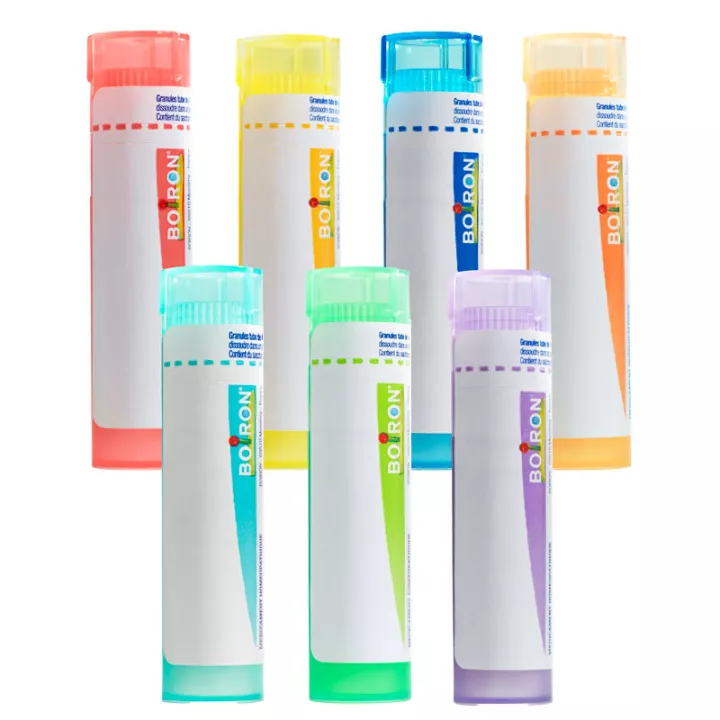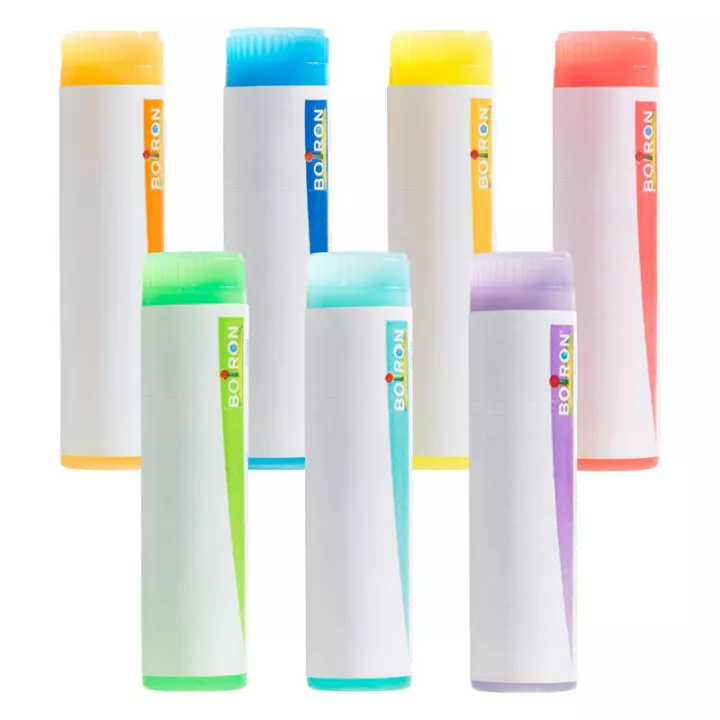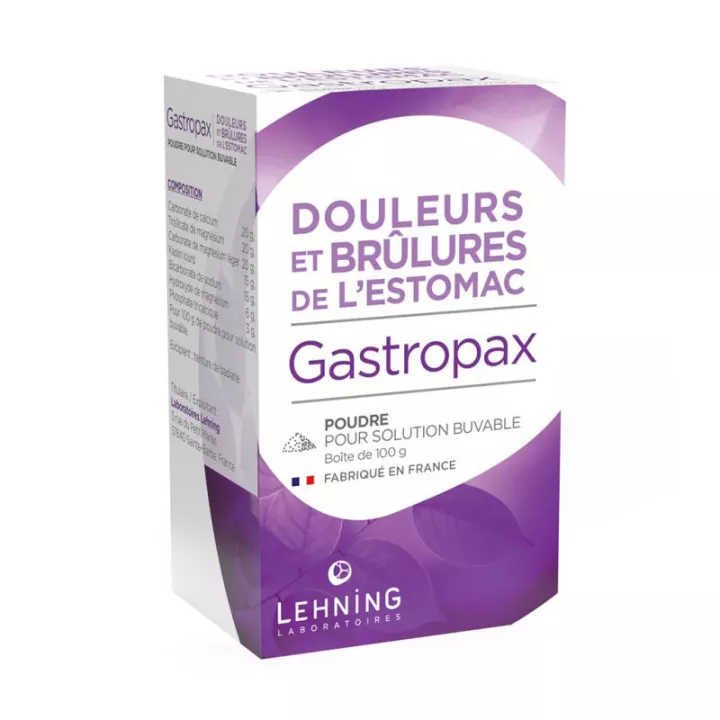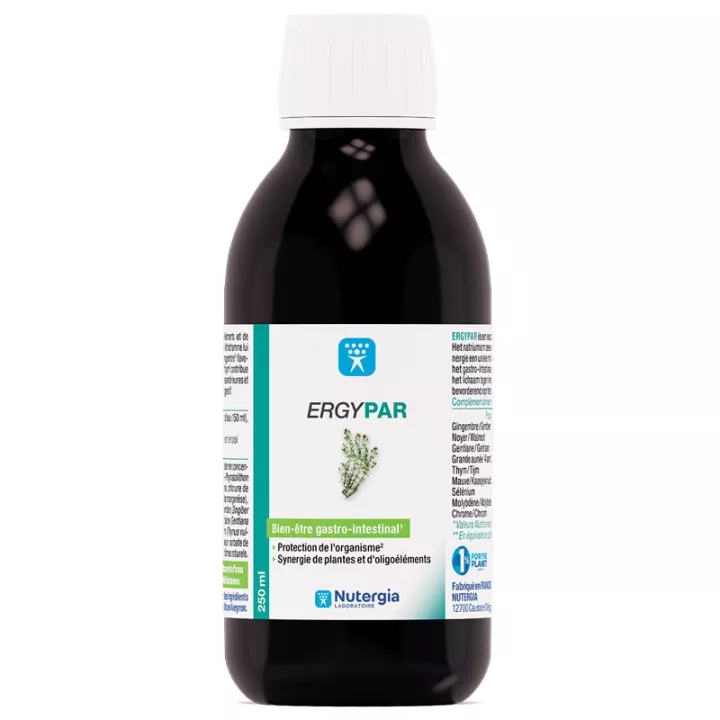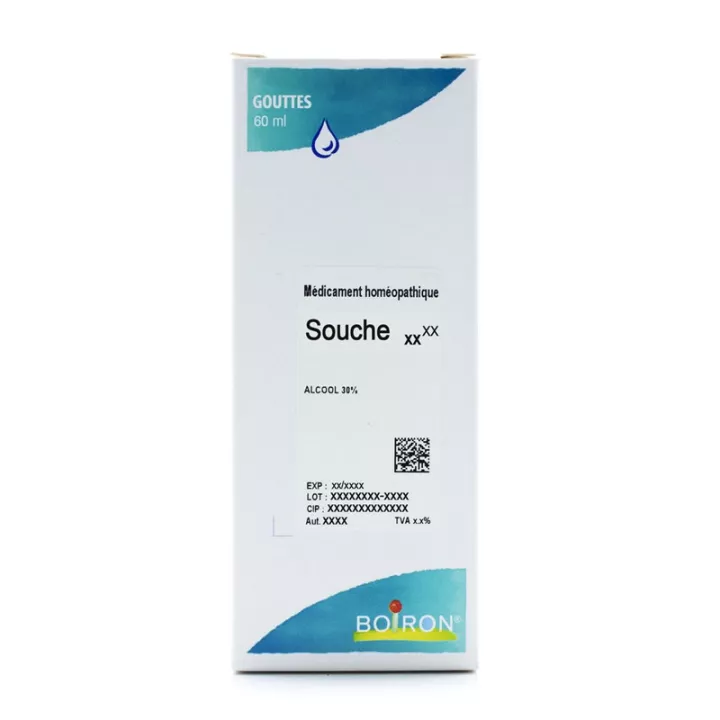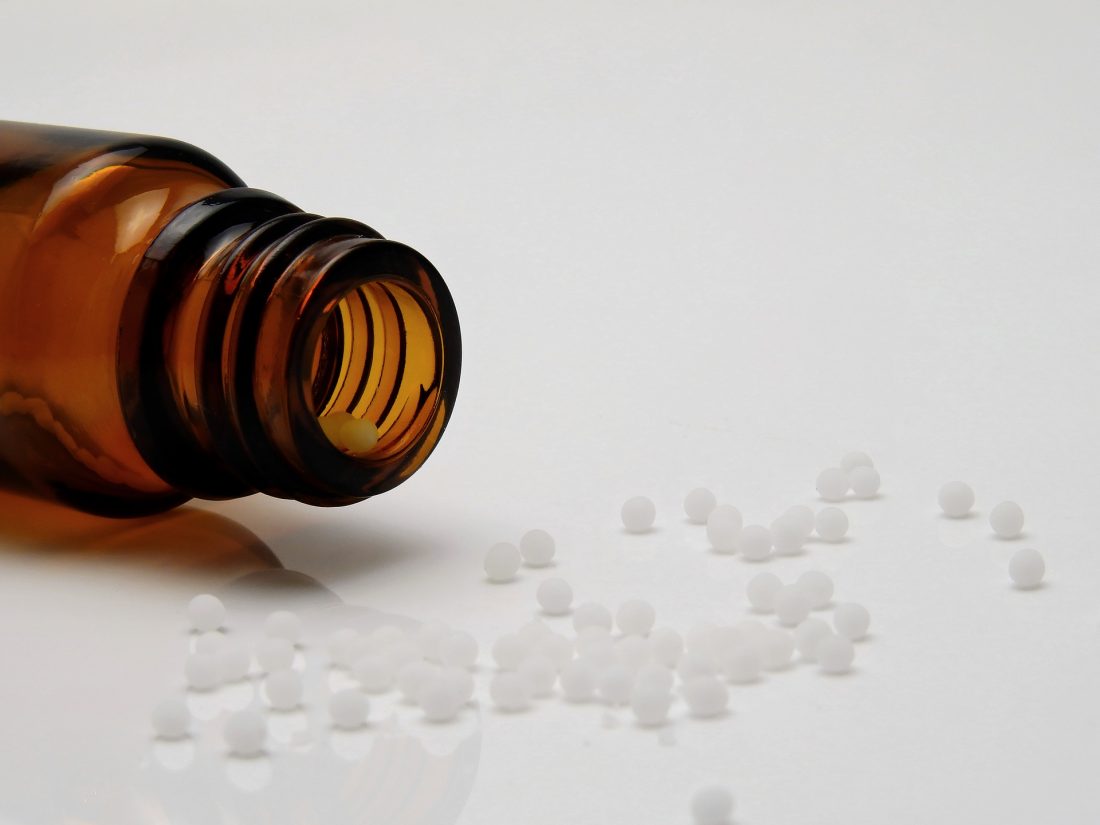Anacardium Orientale Boiron for a Holistic Approach to Health
Anacardium Orientale from the Boiron laboratory is a versatile homeopathic remedy used to treat upset stomach, gastralgia, dyspepsia, as well as certain dermatological and behavioral problems. While it can offer relief for these conditions, it's essential to consult a homeopathic healthcare professional for personalized treatment tailored to your condition. Take care of your overall well-being with Anacardium Orientale Boiron.
SEMECARPUS ANACARDIUM (This strain is available under the registered name Anacardium orientale)
This homeopathic remedy is based on the oriental cashew tree(anacardium orientale).
Oriental cashew is a small tree native to India, belonging to the Anacardiaceae family. The fruit, which contains a white almond, is used to make this medicine.
Homeopathic strain in Hannemanian or Korsakovian dilution
Introduction to the Anacardium orientale species
Theoriental cashew is a shrub in the Anacardiaceae family. Growing mainly in northern India, this tree produces a white kernel commonly known as the Malacca bean. This kernel is used in the preparation of a homeopathic remedy. Anacardium orientale is a homeopathic remedy prepared by macerating the base substance in alcohol. This first process produces the mother tincture, which is then diluted several times. Between dilutions, the solution is shaken or dynamized to maintain and reinforce its therapeutic properties. Anacardium orientale is indicated in the homeopathic treatment of a number of pathologies.
Properties of the Anacardium orientale homeopathic strain
In homeopathy, Anacardium orientale is prescribed to treat a series of symptoms directly linked to intellectual overwork. The patient is often tired and presents intermittent disorders with the sensation of a lump in the body. This homeopathic remedy is very effective with people who seem to have a dual personality (good and bad image).
Other related fields of action: Migraines; Nervous coughs; Palpitations; Eczema; Tendonitis.
Native to northern India, the oriental cashew is a shrub that produces almonds, from which the homeopathic remedy Anacardium orientale is made. In gastroenterology, Anacardium orientale is indicated for treating stomach upsets and conditions such as gastralgia and dyspepsia. In the psychic field, its efficacy has been proven. This remedy improves the well-being of subjects affected by various behavioral disorders. It is prescribed to treat memory disorders, aggressive behavior, depression and eating disorders. The various dilutions of Anacardium orientale help reduce or eliminate symptomatic manifestations on the skin. Anacardium orientale is thus recommended for patients affected by lichen, dermatoses and pruritus.
Anacardium Orientale Boiron: A Versatile Homeopathic Remedy for the Stomach, Skin and Behavior
Anacardium Orientale from the Boiron laboratory is a homeopathic remedy of plant origin, also known as"Fève de Malac". It is traditionally used to treat a variety of disorders, including upset stomach, gastralgia, dyspepsia, as well as certain dermatological and behavioral problems. In this article, we'll explore the common applications of this remedy in homeopathy and its effectiveness in relieving these conditions.
Stomachache and Gastralgia: Relief of Digestive Discomforts
Anacardium Orientale is often recommended in homeopathy for the treatment of stomach aches, gastralgia and dyspepsia. People who experience abdominal pain or discomfort after meals may find relief using this remedy. It is taken into account to help restore digestive balance and alleviate symptoms associated with these gastrointestinal disorders.
Dermatological disorders: Skin support
In addition to its beneficial properties for the stomach, Anacardium Orientale is also used in homeopathy to treat certain dermatological disorders. It can be recommended for skin conditions such as eczema, rashes and itching. Its soothing action on the skin makes it an interesting choice for those seeking natural solutions for their skin health.
Behavioral disorders: Calm and balance
Anacardium Orientale is also known for its potential to treat certain behavioral disorders. It is sometimes recommended for people with symptoms such as irritability, aggressiveness or indifference towards others. This homeopathic remedy aims to restore emotional balance and promote calmer, more balanced behavior.
Indications and dosage for Anacardium orientale
Gastroenterology treatment with Anacardium orientale:
In gastroenterology, Anacardium orientale 9 CH is prescribed for digestive disorders and pain localized in the stomach.
This remedy is prescribed if pain intensifies when the subject performs a movement. Note that pain can also result from deep breathing or mental effort.
Anacardium orientale 9CH is recommended for the treatment of stomach aches and disorders of the digestive tract, such as dyspepsia and gastralgia, a painful and symptomatic excitation of the stomach.
Patients suffering from constipation, nausea and vomiting can use Anacardium orientale 9CH.
Note that the symptomatic manifestations of these digestive disorders are less intense when the patient consumes food.
Treating behavioural disorders with Anacardium orientale:
Anacardium orientale 9 CH is indicated to treat intellectual overwork and split personality. This remedy combats overwork. It is also effective in treating subjects with behavioral disorders.
Thus, it is indicated for angry subjects, easily irritated by overwork, and particularly for irascible students.
Anacardium orientale 15CH is indicated for subjects who are anxious, susceptible or unable to make any intellectual effort.
Dermatological applications of Anacardium orientale:
With its special properties, Anacardium orientale 9CH is indicated for the treatment of skin disorders. This strain is effective in treating various dermatological conditions such as lichen, characterized by the presence of eruptions and purplish papules associated with itching.
Anacardium orientale is particularly recommended for pruritus, itching, dermatitis, desquamation and skin lesions.
Dosage with Anacardium orientale
Recommended dosage for gastroenterological pathologies:
Anacardium orientale 9 Ch is the appropriate remedy for constipation.
Treatment lasts six days, with three granules a day, preferably in the morning and evening.
For stomach complaints that improve with eating, five 9 Ch granules should be prescribed twice a day, at 10 a.m. and 5 p.m., before meals.
Recommended dosage for behavioural disorders:
Treatment for eating disorders lasts fifteen days.
The dosage is five Anacardium orientale 9 Ch granules twice a day. Aggressive subjects can take between three and five granules of 9 Ch twice a day.
When a child is aggressive and swears frequently, three 9 Ch granules should be taken three times a day.
Three 9 Ch granules, three times a day, are prescribed to remedy forgetfulness.
For depression that improves with eating, the dosage is five 9 Ch granules, taken three times a day.
Dosage for skin disorders:
To treat lichen, pruritus and papular eruptions, take three 9 Ch granules before meals.
How to use Anacardium orientale
Remove tab, invert tube and pull cap slightly.
Turn the tube to drop the desired number of granules into the cap, then place the granules under the tongue.
Do not touch the granules or globules with your fingers.
The globules in the dose tubes are absorbed in one go, dissolving slowly under the tongue. If no dose is available, take 10 granules of the same dilution.
Do not take astringent substances such as coffee, tobacco, camphor, mint or chamomile within half an hour of taking homeopathic medicines.
Use a mint-free toothpaste (such as Homéodent Boiron, which is compatible with homeopathic granules).
Professional consultation: the key to appropriate use
As with any homeopathic remedy, it is essential to consult a homeopathic health care professional to determine the appropriate dosage and dose. Each case is unique, and a qualified practitioner will be able to adapt the treatment to the patient's individual needs.
Anacardium orientale packaging and contents
Translucent granule tube (for visualization of remaining granules).
Each tube color corresponds to a dilution
yellow 4CH green 5CH red 7CH blue 9 CH water green 12CH orange 15CH mauve 30CH
Weight 4g. Approx. 80 granules.
Single-dose tube translucent globules (for visualizing remaining globules). Weight 1g.
Dose globules 1g.
Homeopathic strain in Korsakovian dilution
200 K, 1,000 K (or MK or 1MK)
10,000 K (or XMK or 10 MK)
Anacardium Orientale: Discovery of Malac Bean
Anacardium Orientale, commonly known as Fève de Malac, stands out for its significant role in homeopathy and phytotherapy. This oriental plant has been included in both the French and European Pharmacopoeias, demonstrating its recognized importance and efficacy. This article explores the characteristics, preparations and therapeutic applications of Malac Bean, highlighting its usefulness in contemporary natural medicine.
Botanical origin and pharmaceutical registration
Anacardium Orientale, with its precious botanical origin, is registered under the number EH00018, attesting to its quality and compliance with rigorous pharmaceutical standards. Its inclusion in the French and European pharmacopoeias testifies to its therapeutic value and acceptance in the medical world.
Formulations and accessibility
Malac Bean is available in a variety of forms, offering a wide range of options for its prescription and use:
- Homeopathic doses: Available in various concentrations, from 5 CH to 30 CH, these doses can be precisely adapted to patients' specific needs.
- Homeopathic tubes: With dilutions ranging from 4 CH to 30 CH, tubes offer flexibility of use, facilitating personalized administration of the remedy.
- Magistral preparations: The availability of Anacardium Orientale as a magistral preparation, in Hahnemannian dilutions from 2 CH upwards, as well as in Korsakovian dilutions in 200K, 1,000K and 10,000K, underlines homeopathy's ability to provide tailor-made treatments to suit individual conditions and expectations.
Therapeutic applications
Malac Bean is renowned for its beneficial psychological and physical properties. It is often recommended to treat memory disorders, concentration difficulties and depressive states. On a physical level, it can be used to relieve gastrointestinal pain and symptoms associated with nervous imbalances.
Boiron medicines and availability
The presence of Anacardium Orientale in Boiron's product range confirms its place as an essential part of the homeopathic therapeutic arsenal. The diversity of dilutions available offers practitioners and patients a wide range of solutions to address various ailments in a targeted way.
Precautions for using Anacardium orientale
Warning
Contains sucrose. Store homeopathic medicines away from light, heat, moisture, fumes and fragrances.
Giving homeopathic granules to babies and children
For granules or alcoholic drops, dissolve in 100ml of water. Granules take a very long time to dissolve, so you'll need to prepare your mixture in advance.
Homeopathy and pregnancy
Homeopathic medicines have no chemical toxicity, no contraindications, no interaction with other drugs, and no adverse effects linked to the quantity of product ingested. Pregnant women can take homeopathic medicines with no known risk to themselves or their unborn child, but it is advisable to seek advice.
Frequency of homeopathic use
For acute conditions, homeopathic remedies should be taken every hour until symptoms improve. From then on, they should be taken 3 or 4 times a day, spaced out, and then gradually stopped.
For chronic conditions, low-dilution remedies (> 9CH) should be taken 1 or 2 times a day, while basic remedies should be taken once a week, or even once a month. This decision is left to the homeopath.
What to do if there is no improvement within 24 hours
Certain pathologies cannot be treated with homeopathy simply by self-medication. Their severity requires medical advice from a homeopathic doctor. This doctor will judge whether your condition can be treated with homeopathy alone, or whether your treatment needs to be supplemented with allopathy.

